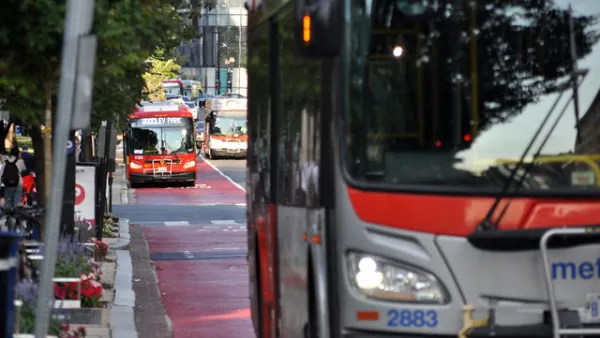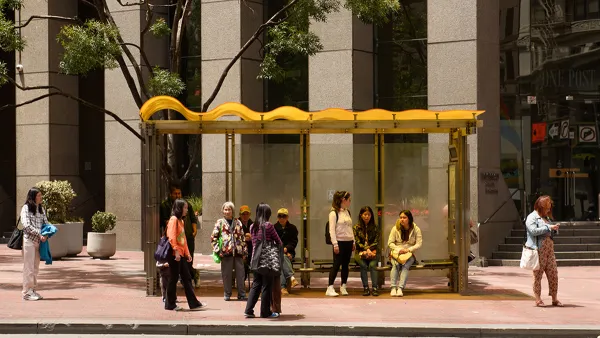A new report, "Subsidizing Traffic Congestion: The Multibillion-Dollar Tax Subsidy That’s Making Your Commute Worse," was released earlier this week by TransitCenter and Frontier Group.
According to Tanya Snyder at Streetsblog USA, the "Subsidizing Traffic Congestion: The Multibillion-Dollar Tax Subsidy That’s Making Your Commute Worse" report by TransitCenter and the Frontier Group finds that the annual parking commuter tax subsidy costs taxpayers an estimated $7.3 billion in foregone revenue. In addition, this backwards incentive adds an additional 820,000 cars to commuting rush-hour traffic each weekday, creating more congestion and lost productivity.
In January 2014, Congressional action caused the commuter transit benefit to fall to $130 each month from one's pre-tax benefits, if driving benefits are $245 per month. As Snyder writes, "[most] advocacy efforts centered on commuter tax subsidies attempt to raise the transit benefit — currently capped at $130 per month. Last week, for instance, two members of Congress pledged to fight for an equal commuter benefit for transit and parking. TransitCenter and the Frontier Group argue that this is the bare minimum to strive for. The real impact lies in simply getting rid of the parking benefit."
Indeed, "TransitCenter and Frontier Group estimate that while most people don’t change their commuting behavior based on the incentives created by these tax benefits, about 2 percent do — and that 2 percent drives 4.6 billion additional miles per year. To make matters worse, they do that extra driving at peak hours, in crowded downtown areas, worsening congestion that the country’s transportation policy is supposedly oriented toward fixing."
The report recommends eliminating the parking tax benefit, making federal support for transit more progressively equitable, and improving and expanding the current transit tax benefit.
FULL STORY: The Parking Tax Benefit: A $7.3 Billion Subsidy for Traffic Congestion

National Parks Layoffs Will Cause Communities to Lose Billions
Thousands of essential park workers were laid off this week, just before the busy spring break season.

Retro-silient?: America’s First “Eco-burb,” The Woodlands Turns 50
A master-planned community north of Houston offers lessons on green infrastructure and resilient design, but falls short of its founder’s lofty affordability and walkability goals.

Delivering for America Plan Will Downgrade Mail Service in at Least 49.5 Percent of Zip Codes
Republican and Democrat lawmakers criticize the plan for its disproportionate negative impact on rural communities.

Test News Post 1
This is a summary

Test News Headline 46
Test for the image on the front page.

Balancing Bombs and Butterflies: How the National Guard Protects a Rare Species
The National Guard at Fort Indiantown Gap uses GIS technology and land management strategies to balance military training with conservation efforts, ensuring the survival of the rare eastern regal fritillary butterfly.
Urban Design for Planners 1: Software Tools
This six-course series explores essential urban design concepts using open source software and equips planners with the tools they need to participate fully in the urban design process.
Planning for Universal Design
Learn the tools for implementing Universal Design in planning regulations.
EMC Planning Group, Inc.
Planetizen
Planetizen
Mpact (formerly Rail~Volution)
Great Falls Development Authority, Inc.
HUDs Office of Policy Development and Research
NYU Wagner Graduate School of Public Service




























